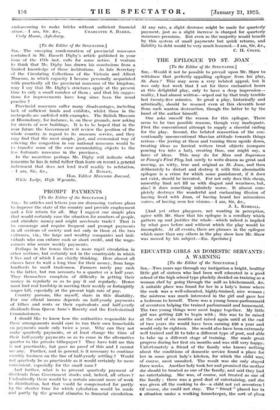PROMPT PAYMENTS [To the Editor of the SPECTATOR.]
Sia,—In articles and letters you are discussing various plans to improve the state of the country and provide employment and a fair return for all. May I suggest one simple plan that would certainly ease the situation for numbers of people, and circulate money and might accelerate trade ? That is to encourage and require frequent and prompt payments in all sections of society and not only in those at the two extremes, viz., the large and wealthy companies and indi- viduals who can enforce cash or short credit, and the wage- earners who secure weekly payments.
Perhaps in the towns there is more rapid circulation in other sections, but certainly not in the countryside in which I live and of which I am chiefly thinking. Here almost all classes have to wait a long time for their money, from large landlords to small tradesmen. Farmers rarely pay cash to the latter, but run accounts to a quarter or a half year. They themselves complain of difficulty in getting their money in regularly so as to pay it out regularly. Hence most find real hardship in meeting their weekly or fortnightly wages bill, especially at the present high rate of pay.
Country parsons, like myself, share in this disability. For our official income depends on half-yearly payments of tithes and rents or their equivalents and half-yearly dividends from Queen Anne's Bounty and the Ecclesiastical Commissioners.
I should like to know how the authorities responsible for these arrangements would care to run their own households on payments made only twice a year. " Why can they not make quarterly payments, or at least change the time of their half-yearly payments so as to come in the alternative quarter to the private tithepayer ? They have told me this is not practicable, but gave no proof of this and I cannot see any. Further, and in general, is it necessary to continue country business on the line of half-yearly settling ? Would not quarterly be as practicable as it would certainly be more convenient, especially for the small man ?
And further, what is to prevent quarterly payment of dividends from Government stocks and, indeed, all others ? Undoubtedly there would be a certain amount more of work in distribution, but that would be compensated for partly by the shorter time for which cslculation would be made and partly by the general stimulus to .financial circulation.
At any rate, a slight decrease might be made for quarterly payment, just as a slight increase is charged for quarterly insurance premium. But even so the majority would benefit" by this system of small payments but quick returns, and liability to debt would be very much lessened.—I am, Sir, &c.,.
C. H. Cotai.














































 Previous page
Previous page